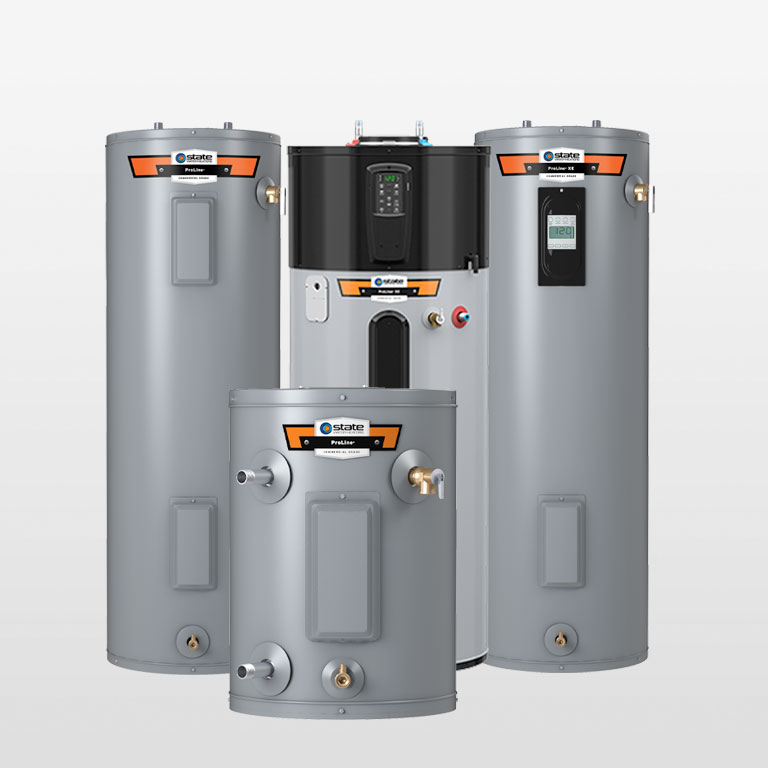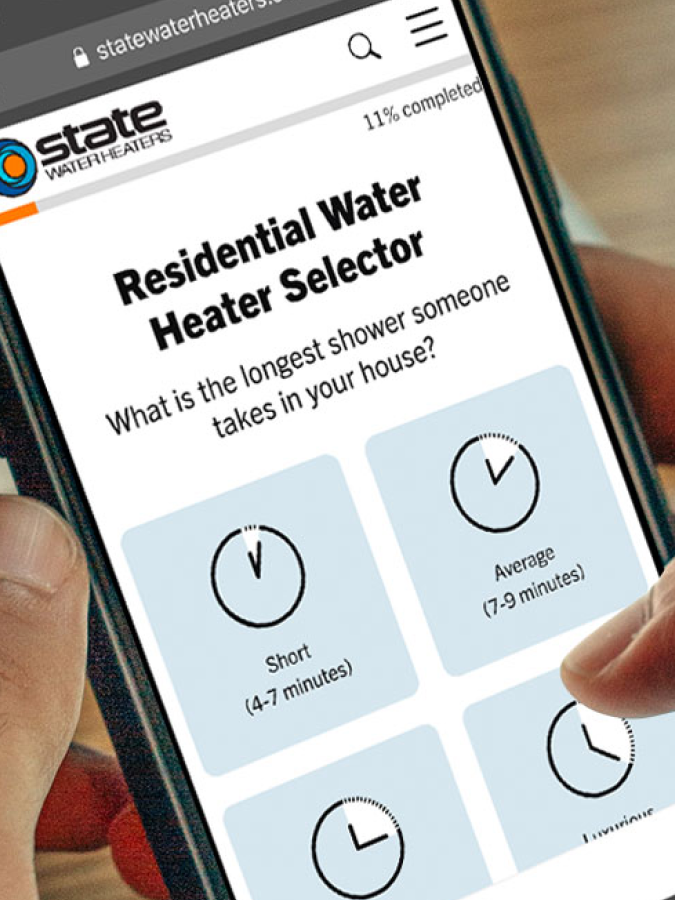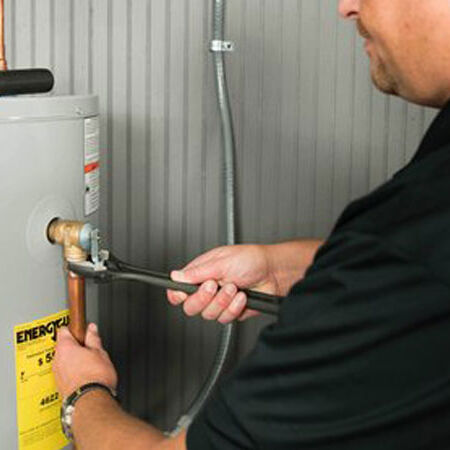.jpg?cx=1265&cy=0&cw=468&ch=625)
How to Choose a Water Heater: A Buying Guide
Choosing the right water heater is an important decision that affects both the comfort and efficiency of your home. No one wants to deal with unexpected cold showers or rising energy bills from an inadequate system. This guide will help you find a water heater with reliable performance and cost-effective hot water for your household needs.
Considerations Before Purchasing a Water Heater

Whether you have just been surprised by a cold shower or want to cut down on energy costs, choosing a new hot water tank is an important decision. Beyond energy efficiency, it's essential to find a unit that can handle your home's and family's hot water demands. To make the process easier and less overwhelming, it's best to determine your needs beforehand. Consider what your household requires in terms of:
- Fuel source
- Type of heater
- Capacity
- Space requirements
- Water heater size
Tip
Find out When to Replace a Water Heater by reading our article.
What Types of Fuel Do Water Heaters Use?
Start by identifying the type of fuel source available in your home. Here's a breakdown of the differences between electric, gas/propane, and hybrid options.
Electric Water Heaters
Electric water heaters are the most common type and require a dedicated 240-volt connection. They use one or two replaceable heating elements to warm the water and are available in energy-efficient models ranging from 28 to over 100 gallons. Key benefits include lower upfront costs, straightforward installation, and safe operation. However, they tend to have slower heating times than gas models, are affected by power outages, and generally come with higher ongoing energy costs.
Gas or Propane Water Heaters
Gas water heaters use a burner to heat the water and are available in sizes ranging from 30 to 100 gallons, making them suitable for various household needs. While they offer efficient heating, there are a few drawbacks to consider. They require adequate ventilation and must be installed with enough clearance from combustible materials. Additionally, gas models tend to have a higher upfront cost compared to electric units.
Heat Pump or Hybrid Water Heaters
Similar to electric water heaters, heat pumps or hybrid models require a dedicated 240-volt connection for safe operation. These units draw heat from the surrounding air to warm the water, making them significantly more energy-efficient than traditional types. They can be installed as standalone units or added to existing tanks and typically come in sizes ranging from 50 to 80 gallons. However, their larger size may not be ideal for smaller spaces without special installation adjustments. Additionally, they tend to have a higher upfront cost, although they offer long-term energy savings.
Types of Water Heaters
There are many types of water heaters available, each designed to meet specific needs—but not all are created equal. If you're trying to figure out which option is best for your household size and available utilities, this water heater buying guide offers reliable insights. Use it as a helpful starting point or bring it with you when consulting a professional for advice on choosing the right unit.
Storage Tank Water Heaters
Storage tank water heaters are the most common type and are available in electric, natural gas, and liquid propane models. These units feature insulated tanks that heat and store water until it's needed. To compare energy efficiency and estimated annual operating costs, check the product label in-store or review the online description. These water heaters offer several advantages, including a range of sizes to fit both tall and compact spaces. Electric models perform efficiently in all climates, and because these units are widely used, repairs and replacements tend to be more affordable. Gas and propane versions also provide the added benefit of continuing to operate during power outages.
Tankless or On-Demand Heaters
Tankless, or on-demand, water heaters don’t store hot water. Instead, they heat water as it flows through the unit's coils. Since they only heat water when it's needed, these units are generally more energy-efficient than traditional storage tank heaters, as they don't need to keep unused water hot. However, tankless units have a limited flow rate, typically providing up to 7.5 gallons of hot water per minute. This makes them a phenomenal option for households that don't require hot water in more than two places at once.
Other advantages of tankless water heaters include their compact, space-saving design, which frees up storage space, and the fact that they eliminate the risk of leaks or burst tanks since they don’t store water. On the downside, tankless units are usually more expensive than conventional models, and you may need additional units to ensure a steady supply of hot water for multiple appliances at once.
Electric Tankless Water Heaters
Electric tankless water heaters offer hot water on demand without the need for the space that a traditional storage tank model requires. They typically have longer lifespans and require less maintenance than standard electric water heaters. While the upfront cost is higher, the energy savings over time can be significant for many households. Unlike tank-style heaters, electric tankless units have different sizing and electrical requirements. It’s crucial to ensure these units are properly sized and that the electrical system meets the heater's specific needs.
Natural Gas Tankless Water Heaters
If your home uses natural gas, upgrading from an old gas tank water heater to a natural gas tankless model could be the best option for both comfort and value. These compact units are roughly the size of a small suitcase and can be installed either indoors or outdoors. They're highly efficient and built to last. However, it's best to have a professional handle the installation of a natural gas tankless water heater for safety and proper setup.
Propane Tankless Water Heaters
Similar to natural gas models, liquid propane tankless water heaters can use existing gas lines to provide a space-saving hot water solution. Propane offers a higher BTU output per dollar than electricity, allowing propane tankless heaters to deliver double the hot water capacity of an electric model. Most propane units can support two to three appliances at once, ensuring that your dishwasher, washing machine, and shower all have enough hot water to operate efficiently. Because of safety considerations, these units generally require professional installation.
Point-of-Use or Utility Water Heaters
Small storage tank water heaters, also called point-of-use (POU) or utility water heaters, are ideal for providing hot water to outbuildings, shops, or garages. These units typically range in size from 2.5 to 19 gallons. The largest models can also be used to supply hot water to secondary bathrooms that are located far from your home's main water heater.
Water Heaters for Mobile Homes
Mobile homes require a specific type of water heater that meets Housing and Urban Development (HUD) standards. Both gas and electric models are available for mobile homes, but if you choose a gas model, ensure it's compatible with either propane or natural gas and suitable for inside or outside access to your home. If the unit is enclosed with no outside access, you may need to opt for a sealed combustion gas water heater. For units with outside access, a standard gas water heater should generally suffice. Be sure to measure carefully before installation, accounting for the smaller door openings in mobile homes to ensure proper fit.
Commercial Water Heaters
Businesses that require a large volume of hot water, such as restaurants, hotels, or laundromats, need a commercial water heater. These units can either be tankless or include a storage tank, depending on the business's hot water needs. Most commercial water heaters are gas-powered, as they offer faster recovery times compared to electric models.
Water Heaters With Advanced Technology and Features
Dry-Fire Protection
Available for some electric water heaters, this feature keeps the upper element from burning out if the unit senses no water around it.
ENERGY STAR® Certification and High-Efficiency Ratings
ENERGY STAR® certified water heaters proudly display the trusted, government-backed symbol for energy efficiency. This certification helps consumers save money and protect the environment by promoting energy-efficient products and practices.
High-efficiency water heaters not only reduce costs but also benefit the environment. Manufacturers indicate a water heater’s efficiency with an energy factor (EF) rating— the higher the EF, the more efficient the model. While some of the most efficient models may have a higher upfront cost, they are designed to save you money over time.
To compare the performance and operating costs of different water heaters, check the EnergyGuide label. This label provides valuable information on performance expectations and estimated annual operating costs for the model you're considering.
Intuitive Technology
Water heaters with advanced technology automatically adjust temperature and other settings based on your specific needs and usage patterns. Choosing a heater with this responsive technology offers benefits such as improved energy efficiency, enhanced durability, and smarter overall performance.
Premium Electronic Gas Valve
Some modern gas water heaters come equipped with an electronic gas valve. With fewer moving parts than traditional mechanical valves, these models offer more reliable and precise performance, ensuring better temperature control and faster hot water recovery. An LED indicator shows when the pilot light is on and provides diagnostic feedback on the unit’s performance. The innovative valve is powered by a thermopile, which converts thermal energy into electricity, eliminating the need for an external power source and simplifying installation. Additionally, these water heaters can display troubleshooting codes when an issue is detected, making maintenance and repairs easier.
Wi-Fi Water Heater Capabilities
Some electric water heaters now come with a Wi-Fi module, allowing you to control the water temperature remotely. You can set a customized schedule to ensure your water heater only provides hot water when you need it, helping to reduce energy costs. These units also send alerts if the tank runs low on hot water.
Water Heater Accessories
There are many hot water tank accessories available to improve the safety and efficiency of your water heater.
Expansion Tanks
Expansion tanks are designed to hold extra water produced by the heater when heating cold water in the main tank. These accessories are connected to your standard water heater tank through your plumbing system.
Water Heater Timers
Reduce energy consumption and save money by using your water heater only when necessary. You can install a water heater timer into the unit's electrical supply, allowing you to set specific times for the heater to draw electricity.
Water Leak Detectors and Alarms
Water leak detectors are placed on the floor or in the pan next to the water heater, where they detect any leaks or overflows and sound an audible alarm to notify the homeowner of the issue. Some models are Wi-Fi-enabled and can send alerts directly to your smartphone.
Water Heater Insulation Blankets
These blankets are designed to cover the water heater and enhance its insulation. Insulating blankets are especially useful for heaters located in garages or other unheated areas.
Water Heater Pans
These pans are placed beneath the water heater to catch any water from leaks or overflows caused by excess pressure in the tank. The pan includes a side opening for a drain hose to carry the overflow water away.
Water Heater Stands
Water heater stands elevate gas units off the ground, helping to reduce the risk of fire if flammable liquids are spilled nearby. If you're replacing an old water heater and adding a stand to the new one, it will impact the measurements, plumbing, and venting. Unless you have advanced plumbing experience, it's best to hire a professional for installation. In some cases, building codes require water heaters to be mounted on stands, especially in garage installations.
Frequently Asked Questions
Regular maintenance of your water heater helps ensure optimal energy efficiency and provides an opportunity to visually inspect components, allowing you to address minor issues before they turn into major problems. This guide covers the basic tasks needed to keep your water heater in good working condition over time.
- Once or twice a year, perform a visual inspection of the water heater, checking for loose screws, connections, or any obvious signs of damage or leaks.
- Flush the tank at least once a year to clear out any sediment or buildup at the bottom, improving water quality.
- Make sure the temperature and pressure (T&P) valve is functioning properly.
- Check the sacrificial anode rod and replace it if it's corroded.
If you're not comfortable performing these tasks yourself, consider calling a local professional for help with regular water heater maintenance.
A residential water heater, whether tanked or tankless, is designed to provide hot water on demand for everyday activities like running a washing machine or filling a bathtub. Storage tank models typically hold up to 80 gallons, and the recommended temperature for residential units is 120 degrees Fahrenheit or lower to prevent scalding and burns.
In contrast, commercial water heaters are built to provide a consistent and reliable supply of hot water for businesses like restaurants, hotels, office buildings, and apartments. These units are designed for continuous use, with larger capacities—often storing 250 gallons or more—and heavy-duty components to handle high demand. Commercial water heaters also feature higher temperature settings to ensure the water is hot enough for tasks like sanitizing dishes or washing towels and bed linens. Most commercial units are gas-powered, with multiple inputs to support large tanks.
Manufacturers categorize storage tank water heaters based on their water capacity in gallons. To make sure your household has enough hot water, it's essential to estimate your average hot water usage. If you don't opt for a tankless model, a larger household will require a bigger tank.
Another factor to consider is the recovery rate, which indicates how many gallons of water the heater can warm in an hour while refilling the tank. The higher your hot water demand, the greater the recovery rate you'll need. Additionally, you must consider the number of fixtures or appliances that will be using hot water at the same time.
To help you choose the right water heater for your home, refer to these recommendations. If you're going for a tank-style water heater, the following guidelines will help you select the right size.
Minimum Gallon-Capacity Recommendations:
Electric Water Heater
Family of 1 to 2: 30 gallons
Family of 2 to 3: 40 gallons
Family of 3 to 4: 50 gallons
Family of 5 or More: 80 gallons
Gas Water Heater
Family of 1 to 2: 30 gallons
Family of 2 to 4: 40 gallons
Family of 5 or More: 50 gallons
If your space doesn’t have room for a standard-sized water heater, alternative options are available. These alternatives deliver the same performance as a standard model and are compatible with electric, natural gas, or propane systems.
Lowboy and Short Water Heater Space Requirements
These electric models are designed to be shorter and wider than traditional water heaters. They offer the same water capacity as larger units but are compact enough to fit in spaces with limited headroom, such as crawl spaces or beneath cabinets. Lowboy water heaters typically range from 30 to 49 inches in height and can hold up to 50 gallons of water.
Tall Water Heater Space Requirements
Gas and electric tall water heaters range from 50 to 76 inches in height and can hold up to 100 gallons of water. They are well-suited for spaces like basements or garages where height is not a limitation. If you opt for a hybrid water heater, keep in mind that it requires additional space to operate efficiently, so be sure to consult the manufacturer's guidelines for proper installation.

Not sure which product is right for you?
Take our water heater selector quiz to find the correct water heater for your home.

Find A Local Water Heater Pro
State Water Heaters are professionally installed by local independent contractors.